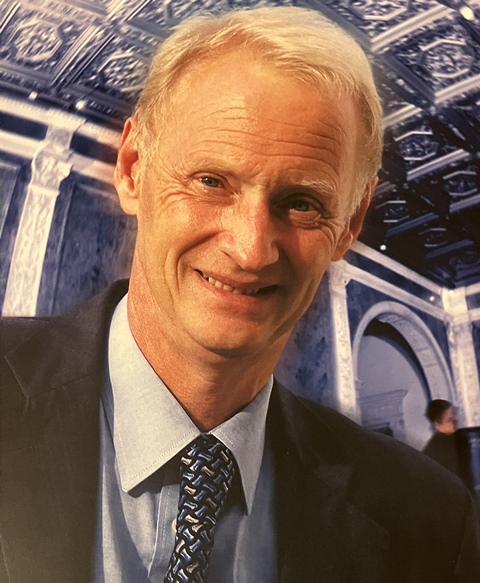 [photo courtesy of The Royal Society]
[photo courtesy of The Royal Society]
Stephen Cox, who died on 23 February 2024 aged 77, was a stalwart of the Round Table for many years, a man of great energy and enthusiasm allied to wit and wisdom who will be missed by his many colleagues and friends.
Born in Blackburn on 5 December 1946, the son of Harold and Norah Cox, Stephen was educated at Queen Elizabeth Grammar School, Blackburn, and then at the newly-opened Atlantic College in South Wales, an international sixth-form school where he was one of the first students. After VSO in Bolivia in 1965-6 he took a geography degree at Birmingham University followed by a postgraduate diploma in teaching English as a second language at Leeds University. (He later also took an MA in education from the University of Sussex.)
In 1970 Stephen joined the British Council and was immediately posted to Warsaw at the height of the Cold War. Postings to Ghana and Washington DC followed, interspersed with several London postings. From 1981 to 1984 he was chair of the trade union side of the British Council’s Whitley Council.
In 1984 he joined the Royal Society as an assistant secretary to head their international programmes, liaising with scientists around the world, especially in the USA, Europe, and the Commonwealth.
Stephen became director-general of the Commonwealth Institute in London in 1991 at a time when the Institute still occupied its distinctive building on Kensington High Street and ran a packed programme of artistic and cultural events. For the last two of his years there (1995-7) he was also concurrently chief executive of the Westminster Foundation for Democracy, working to support emerging pluralist democracies in eastern Europe and Africa south of the Sahara. He was made a CVO in 1997.
In 1997 Stephen returned to the Royal Society as executive secretary, subsequently re-titled executive director, in effect the society’s chief executive, in which post he served under and worked closely with four very different presidents (Sir Aaron Klug, Sir Robert May, Lord Rees of Ludlow, and Sir Paul Nurse) over a period of fourteen years.
Alongside his demanding work, Stephen found time to give his expertise pro bono to a wide range of organisations and professional bodies including the British Science Association, the Council for Assisting Refugee Academics (now the Council for At-Risk Academics), and the Royal Geographical Society (of which he was elected a fellow). After retiring in 2011 he chaired the council of Royal Holloway, University of London, from 2011 to 2018 and the governing body of Atlantic College from 2010 to 2015. He was also a trustee of the Frederick Soddy Trust (2011-22).
Stephen joined the editorial board of the Round Table in 1992 and was an active and much respected member for almost thirty years. He served as chair of the board from 2002 to 2005 and was remembered for the efficiency with which he dispatched business, leaving more time for the discussion of current affairs in which he was always interested. He became an emeritus member in 2021.
Stephen’s passions included cricket (he was a member of both the Middlesex and Surrey county cricket clubs), art, architecture, travel, and meeting people. He was very much an internationalist and a man without prejudices. In 1970 he married a fellow geography student at Birmingham, Pauline Greenwood, who as Pauline Cox became a respected educationist, and head teacher of The Tiffin Girls’ School in Kingston upon Thames from 1994 to 2010. She survives him, with their daughter Rachel and son David.
Stephen wrote a brief history of ‘The Commonwealth Institute: A Tale of Two Buildings’ (https://www.tandfonline.com/doi/full/10.1080/00358533.2019.1657727) for The Round Table in 2019. He also wrote a short history of ‘The Royal Society in Cold War Europe’ (https://royalsocietypublishing.org/doi/full/10.1098/rsnr.2010.0052?rss=1) for the Notes and Records of the Royal Society in 2010.



